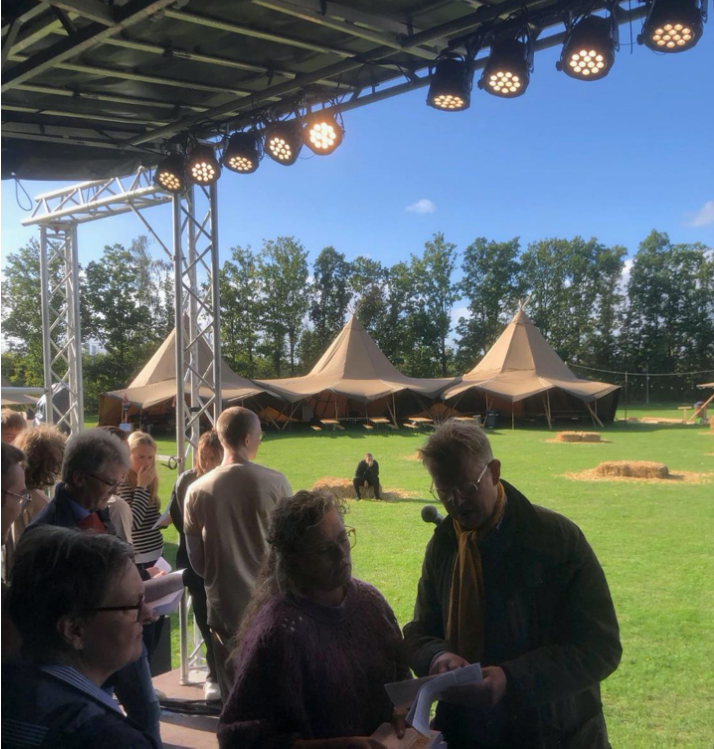Location: Køge, Zealand, Denmark
Case contact persons: Jacob Skjødt Nielsen Planning, Building & Environmental Administration, Køge Kommune, Project leader, Snorre Mørch and Thor Kjøller Hartmann, Green Transition and Environmental Administration, Køge Kommune.
Case study conducted by: Mark Barnes-Ricketts (Visiting Professor Collaborative and Collective Intelligence), Denise Barnes-Ricketts (Visiting Professor Collaborative and Collective Intelligence), Dr Adam Svendsen (International Intelligence Engineer & Strategic Analyst, University of Salamanca, Madrid, Spain), Dr Bruce Garvey ( Strategic Analyst, Specialising in Morphological Sciences and Technologies and Strategic Options Analysis), and Kenneth Hansen (Digital Pedagogies and knowledge Transfer).
Time span: 3 years
Green SDGs: Contributing to a green transition SDG 7, SDG 11, SDG 12, SDG 13, SDG 14, and SDG 15.
Partners: Køge Kommune, KLIMAXfestival, Tapperiet Youth and Culture Center, Theatre Bygningen, Køge Ungdomsskole, Køkkenet OM:HU and Zealand Academy.
Data sources available: Interviews, documents, observations, collective and collaborative intelligence, action research activities.

The KLIMAXfestival is part of Køge Kommune’s commitment to increasing the active engagement of Citizens in respect of all aspects of Sustainability and the Green Transition in Community life. In terms of structure and anchoring, the Festival focuses on three primary headings, the local, the regional and the global. The budget for the festival’s first two years is co-financed by Køge Municipality as part of the developing, Køge Nord Forest City Plan for which the Kommune is seeking to develop community consensus in the planning process.
The keystone actors for the Køge Nord Forest City Plan are the Municipality’s promoted contractors, who together with current and future citizens must complete the development and realization of the project in a way that the Citizens will adopt as their own – and who must therefore be involved in both the strategic and operational dialogues leading to its completion. The intention therefore is to create an enduring framework for strong, citizens collaboration in the present, and the development of the future of cultural life and green transition in Køge Municipality, which will also provide something which is attractive for investors and people moving to the area.
Climate is the driving agenda, of course, but with the ambition to create a spacious city which embraces its heritage or cultural values, but which is, at the same time, inclusive. In the immediate period it is also important that culture, sustainability, and leisure must be the catalysts to create something in the interim, even as the building of Køge Nord Skovby is being undertaken and completed, and it is hope that festival will motivate a unique and productive laboratory of opportunities for people to try things out, with projects which are broadly aimed at all age groups and involving Citizens already living in Køge Municipality, as well as interested parties from outside.
The festival themes are therefore being developed through art exhibitions, cultural events, concerts, theatre performances, museum tours and practical demonstrations related to textiles, construction, local food production, waste management, biodiversity, recycling of materials and other green transition activities, which will all help to underpin the Kommune’s ongoing commitment to sustainability, green production, transformation and development – by linking together cultural actors, green zealots, learning communities, green associations, and producers of all kinds, with Citizens and the Community.
Køge Municipality has supported the festival wholeheartedly in the start-up, which has ensured a professional level of experience and festival management from the outset, with the hope that in the long term, with a degree of professional Civic engagement, and strong partners, the festival can be provided for financially, and live on as an economically sustainable model.
In GOGREEN, we define the green SDGs as the following SDGs: SDG 6, SDG 7, SDG 11, SDG 12, SDG 13, SDG 14, SDG 15
This website uses strictly-necessary cookies. To read more about WordPress cookies, click here. Please click on the ‘Accept’ button to continue on to the GOGREEN Project site.